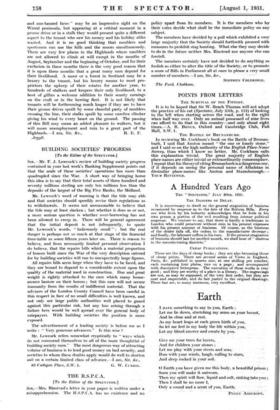BUILDING SOCIETIES' PROGRESS [To the Editor of the SPECTATOR.] Sin,—Mr.
F. J. Leweock's review of building society progress contained in your last week's Banking Supplement points out that the scale of these societies' operations has more than quadrupled since the War. A short way of bringing home this idea is to say that their total assets of three hundred and seventy millions sterling are only ten millions less than the deposits of the largest of the Big Five Banks, the Midland.
Mr. Leweock's word of warning is that the tide may ebb and that societies should speedily revise their regulations as to withdrawals. It seems not unreasonable to believe that the tide may at least slacken ; but whether it does so or not, a more serious question is whether over-borrowing has not been allowed to creep in. There will be general agreement that the initial deposit is not infrequently, to quote Mr. Leweock's words, " ludicrously small " : but the real danger is perhaps not so much at that stage of the financial time-table as some fifteen years later on. There is reason to believe, and from necessarily limited personal observation I do believe, that the repairs bills which a material proportion of houses built since the War of the very description catered for by building societies will run to unexpectedly large figures.
All repairs bills seem large when they have to he faced, and they are bound to depend to a considerable extent upon the quality of the material used in construction. Due and great weight is rightly attached to the care which many house- owners bestow on their homes ; but this care will not secure immunity from the results of indifferent material. That the advisers of the London County Council have been careful in this respect in face of no small difficulties is well known, and not only are large public authorities well placed to guard against this particular risk, but any loss arising through a failure here would be well spread over the general body of ratepayers. With building societies the position is more exposed.
The advertisement of a leading society is before me as I write : Very generous advances." Is this wise ?
Mr. Leweock refers somewhat cryptically to " ways which do not commend themselves to all of the more thoughtful of building society men." The most dangerous way of attracting volume of business is to lend good money on bad security, and societies to whom these doubts apply would do well to shorten sail on a certain limited class of advance.—I am,


































 Previous page
Previous page